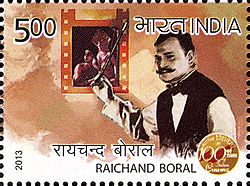Raichand Boral facts for kids
Quick facts for kids
Raichand Boral
|
|
|---|---|
| রাইচাঁদ বড়াল | |

Boral on a 2013 stamp of India
|
|
| Born |
Rai Chand Boral
19 October 1903 |
| Died | 25 November 1981 (aged 78) |
| Nationality | Indian |
| Occupation | Music director |
Rai Chand Boral (born October 19, 1903 – died November 25, 1981) was a very important Indian music composer. Many people call him the "father of film music" in India. He helped create the way music is used in Indian movies today.
He won two of India's highest awards in 1978. These were the Dadasaheb Phalke Award for cinema and the Sangeet Natak Akademi award for music and arts.
Contents
Early Life and Music Training
Rai Chand Boral was born in Kolkata (then called Calcutta). His father, Lal Chand Boral, was a skilled classical musician. He was an expert in a music style called Dhrupad.
Rai Chand was the youngest of three sons. Famous musicians were invited to their home to teach them. These teachers included Ustad Mushtaq Hussain Khan and Ustad Hafiz Ali Khan. Rai Chand learned to play the tabla, a type of drum. He also went to many music events and conferences.
A Pioneer in Film Music
Raichand Boral is known for being a true pioneer in Indian film music. He worked at a famous film company called New Theatres. There, he was in charge of the music department with Pankaj Mullick.
Together, they set high standards for film music. Their ideas shaped how music was made for movies for many years. Boral also helped famous singer K.L. Saigal start his career. Another composer, Anil Biswas, called Boral the "Bhishma Pitamah of film music." This means he was like a wise elder or founding father.
Boral first joined the Indian Broadcasting Company in 1927. In 1931, he moved to New Theatres. At first, he provided live music for silent films. He blended the Ghazal singing style from North India with traditional Bengali tunes.
Introducing Playback Singing
A huge change came in 1935 when Boral introduced playback singing. This was for the Hindi film Dhoop Chhaon. Playback singing means that actors lip-sync to a song that was recorded earlier by professional singers. Before this, actors had to sing live during filming. The first playback song was "Main Khush Hona Chahun." It featured an all-women chorus.
After 1953, Boral moved to Mumbai (then Bombay). He continued to compose music for films there. His last well-known film with New Theatres was Anjangarh (1948). He composed music for about 70 to 75 films in total. These included both Hindi and Bengali movies.
Awards and Recognition
In 1978, Rai Chand Boral received the Dadasaheb Phalke Award. This is the highest honor in Indian cinema. He was 75 years old at the time.
In the same year, he also received the Sangeet Natak Akademi award. This is the top award for performing artists in India. It is given by India's National Academy for Music, Dance, and Drama.
Rai Chand Boral passed away in 1981 when he was 78 years old. He left behind a great legacy in Indian film music.
Film Music Composed by Raichand Boral
Raichand Boral composed music for many films. Here are some of his notable works:
- Mohabbat Ke Ansu (1932)
- Zinda Lash (1932)
- Puran Bhagat (1933)
- Chandidas (1934)
- Dhoop Chhaon (1935)
- Manzil (1936)
- Vidyapati (1937)
- President (1937)
- Street Singer (1938)
- Lagan (1941)
- Hamrahi (1945)
- Anjangarh (1948)
- Shri Chaitanya Mahaprabhu (1954)
- Nilachale Mahaprabhu (1957)
- Dena Paona (1931) (Bengali)
- Debdas (1935) (Bengali)
- Udayer Pathey (1944) (Bengali)
 | Percy Lavon Julian |
 | Katherine Johnson |
 | George Washington Carver |
 | Annie Easley |

